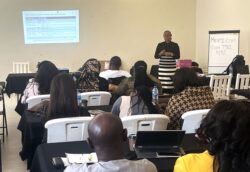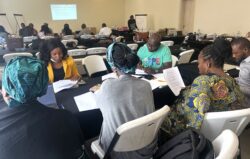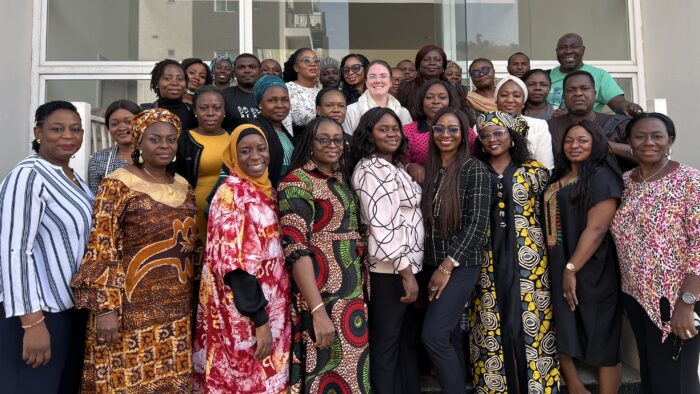
Transforming Gender Norms for Women’s Economic Empowerment in Nigeria
Social norms wield an invisible yet profound influence on the fabric of societies, dictating behaviors, beliefs, and expectations within communities.[1] In the context of women’s economic empowerment, these unspoken rules often act as barriers, shaping women’s access to resources and opportunities. They can perpetuate inequalities, presenting a formidable challenge to change. A United Nations report identified harmful social norms as the primary obstacle impeding women’s economic advancement worldwide.[2]
In Nigeria, norms around masculinity tend to justify violence and restrictions on women’s mobility, agency, and ability to own property or access resources, as well as their ability to pursue paid employment and other economic opportunities. Social norms also vary dramatically based on geographic area. Unpacking social norms and shifting gender-discriminatory beliefs and narratives is central to advancing women’s economic empowerment, gender equality, and overall development outcomes.

Participants in the Social Norms Workshop review key terms and definitions.
Under the United States Agency for International Development (USAID) Gender Integration for Technical Assistance II (GITA II) task order, Banyan Global provides technical assistance for USAID/Nigeria and its implementing partners to advance women’s economic empowerment. As part of this effort, Banyan Global designed and delivered a workshop to assist development practitioners in Nigeria to better integrate social norms change into their project design. Participants included USAID staff and implementing partners. The workshop was part of a quarterly gathering of gender focal points of USAID/Nigeria activities to facilitate learning and coalition building. Gender focal points serve to advocate for and be internal resources to promote gender integration within activities, and many of the participants were already familiar with social norms change and had communications-based interventions included in their projects.
Banyan Global designed the workshop to highlight evidence-based approaches tailored to the Nigerian context. Using findings from the Advancing Women’s Economic Empowerment: Social Norms Landscaping Study, the Banyan Global team discussed Nigeria-specific examples of norms change initiatives that employ one or more of four proven strategies to shift social norms:
- Household methodologies combined with sector-based activities, such as agriculture or global health.
- Group-based collective action and learning that increase women’s productivity and financial inclusion.
- Meaningful male engagement.
- Context-specific gender analyses and norms diagnostics to measure the strength of norms.
The workshop provided practical exercises, case studies, and tools. It featured interactive group exercises on diagnosing social norms, implementing household methodologies, developing platforms for group-based collective action, and approaches for engaging men. Participants practiced applying the four proven strategies to diverse sector examples. In addition, the workshop helped participants identify risks and common pitfalls in project implementation. The facilitators walked participants through analyzing risks associated with shifting power dynamics and underscored the importance of “do no harm.”

Participants in the Social Norms Workshop participate in a small group sharing exercise.
The workshop provided participants with practical strategies for integrating norms change within their work. USAID implementing partners will be better able to analyze gender norms that impact their target development objectives and identify opportunities for meaningful approaches to address these norms. For USAID staff, the workshop underscored the importance of encouraging evidence-based norms change approaches as part of solicitations and activity design.
Participants found the workshop both educational and engaging. By the end of the workshop, participants discussed the importance of ensuring the knowledge is passed on to other colleagues and stakeholders at the community level. Transforming social norms takes time, and planning long-term engagements that work closely with individuals, families, and reference groups is essential to go beyond awareness-raising approaches.
One participant shared, “This will go a long way in educating the officers on my project on how to better pass our message onto the community.” They also shared their renewed commitment to “be conscious, be intentional, and think creatively for behavioral change and social reorientation towards advancing positive gender norms.”
Workshops like this one are some of the first steps to create more pathways toward equal gender norms and in the longer term, equal power. By the end of the workshop, 97 percent of participants agreed that the session enhanced their learning and 100 percent agreed that they feel confident and able to apply what they learned in their work.

Social Norms Workshop participants in Nigeria pose for a group photo.
[1] UNICEF, Defining Social Norms and Related Concepts, November 2021, Social-norms-definitions-2021.pdf (unicef.org).
[2] Leave No One Behind – A Call to Action for Gender Equality and Women’s Economic Empowerment (Link).
